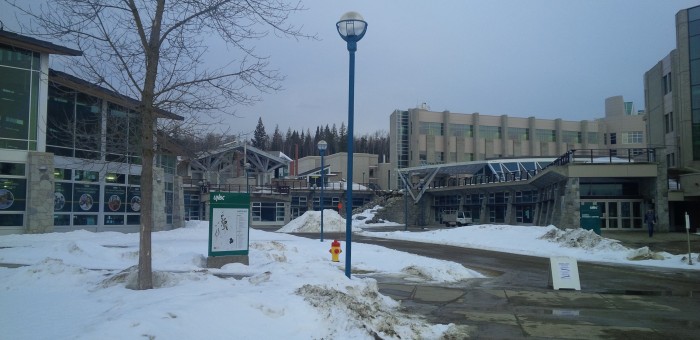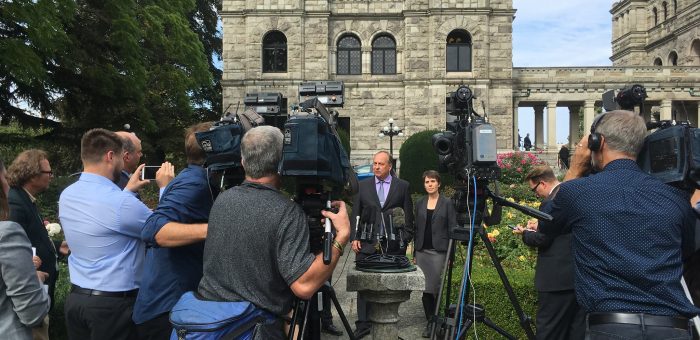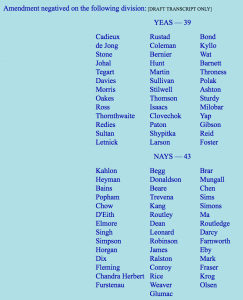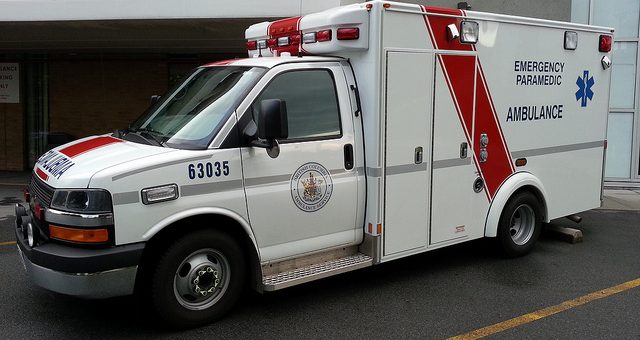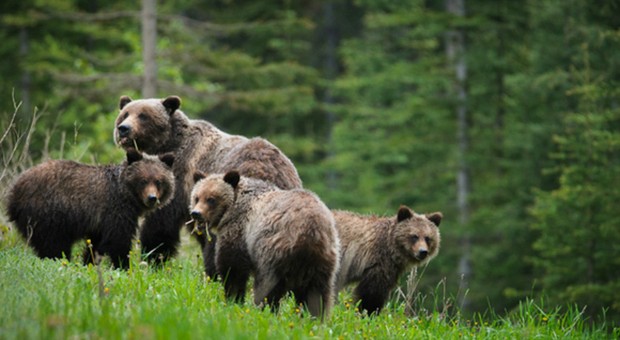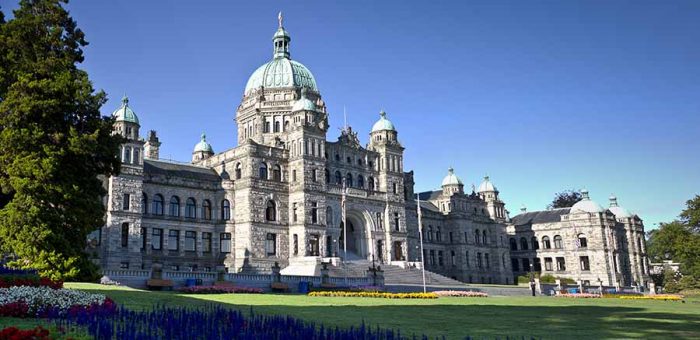Issues & Community Blog - Andrew Weaver: A Climate for Hope - Page 82
Reintroducing a bill to reform university governance in British Columbia
Today in the legislature I reintroduced a private member’s bill now entitled Bill M204 —University Amendment Act, 2017. The purpose of this bill is to halt the creeping government interference in university governance, an issue I have previously raised.
I provided a detailed rationale for the bill l when I first introduced it in February 2017.
Below I reproduce the video and text of today’s introduction along with the accompanying media release.
Video of Introduction
Text of Introduction
A. Weaver: I move that a bill intituled the University Amendment Act, 2017, of which notice has been given in my name, be introduced and read a first time now.
I’m pleased to be introducing a bill, intituled the University Amendment Act. Universities in this province of British Columbia serve a key role in an economy that is increasingly driven by knowledge, information and ideas. Academic freedom is a fundamental tenet for a culture of learning to succeed and a key part of academic freedom is found in the right to participate in the universities governance. While the role of a board of governors is essential to a university, the governance of a university must also be independent.
It is with this in mind that I bring this bill forward today. This bill amends the University Act to ensure that appointees from the Lieutenant-Governor-in-Council cannot unilaterally set the tone and direction of a university board through having a majority of votes and that the university boards cannot unilaterally appoint a chancellor for their university.
This act also amends the University Act to change the composition — not the powers — of the senate for special purpose teaching universities.
The current composition of the senates of special purpose teaching universities gives the administration of these universities the majority vote. This harms the ability of the senate to keep the academic autonomy of the university at arm’s length from government.
This bill will bring British Columbia into the same university governance standards employed by much of the rest of Canada.
Motion approved.
A. Weaver: I move that the bill be placed on the orders of the day for second reading at the next sitting of the House after today.
Bill M204, University Amendment Act, 2017, introduced, read a first time and ordered to be placed on orders of the day for second reading at the next sitting of the House after today.
Media Release
Andrew Weaver introduces bill to protect the independence of universities
For Immediate Release
October 25, 2017
VICTORIA, B.C. – Andrew Weaver, leader of the B.C. Green Party, today introduced a Private Member’s Bill that would protect the independence of B.C. university governance. Weaver previously introduced this bill in February 2017, as well as similar legislation aimed at addressing the issue of university governance in 2016. The legislation would bring B.C.’s rules in line with the majority of other Canadian jurisdictions.
“Our universities must be a place where innovation and creativity are allowed to flourish,” said Weaver.
“In B.C., there has been a worrying trend of creeping political interference in university governance. The potential for government to drive a top-down imposition of its ideology in our academic institutions is absolutely unacceptable in a free democracy. This bill would ensure that B.C.’s university boards remain autonomous so that critical thinking and the untethered pursuit of knowledge can drive their work.”
This Bill amends the University Act to ensure that appointees from the Lieutenant Governor in Council cannot unilaterally set the tone and direction of a university board through having a majority of votes, and that university boards cannot unilaterally appoint a Chancellor for their university.
It also amends the University Act to change the composition of the Senate for special purpose teaching universities. As it currently stands, it is possible for the administration (instead of faculty) of these universities to have the majority vote which harms the ability of the senate to keep the academic autonomy of the university at arm’s length from government.
-30-
Media contact
Jillian Oliver, Press Secretary
+1 778-650-0597 | jillian.oliver@leg.bc.ca
On moving the fixed fall election date from October 2021 to October 2020
Today in the BC Legislature the BC Liberals proposed an amendment at committee stage to section 3 of Bill 5: Constitution Amendment Act 2017. The purpose of this amendment was to change the date of the next election from October 2021 to October 2020.
After listening to the arguments proposed by the BC Liberals I stood and spoke against the amendment.
The BC Liberals subsequently called for a standing vote and the amendment was defeated.
Below I reproduce the video and text of my statement. These outline the reasons why I voted the way I did. I also append the results of the vote.
Video of Statement
Text of Statement
A. Weaver: I rise to speak against the amendment put forward today by the official opposition, for a number of reasons. The amendment, of course, as we know, is to change the fixed election date to 2020 instead of 2021. The member opposite does himself a disservice when he continues to refer to government here as a coalition.
The member opposite, as he tries to put forward his wealth of expertise in democratic reform in British Columbia, should know at a very fundamental level that a coalition is not what we have here in British Columbia. It is a minority government, where the majority of members in this House support the B.C. NDP in government.
It would do this member well — and it would do opposition members opposite well — if they actually were to be factual in their responses and debates. To mislead British Columbians by talking about things like a B.C. coalition is not fitting of members of this place.
We know that it is a minority government, under the great vast tradition of Westminster parliamentary democracies, where the government of the day, the B.C. NDP, is supported by the three B.C. Green members in a minority, not a coalition. So I correct that for the record.
We know that under the Constitution Act, we must have an election every five years. The member opposite, again, in what I can only describe as a somewhat revisionist history, forgets to point out that in 1986, the Social Credit government, the 1986 elected Social Credit government did not have an election for five full years, until 1991. Five years — not four years, as was suggested by the members opposite.
Here, what is happening, and why I do not support the amendment and why I support the original legislation, is as follows. Again, in the tradition of Westminster parliamentary democracies, we stood here in this House and pointed out to the B.C. Liberals this past summer that they did not have the confidence of the House. We didn’t quietly spring this on them at the last minute. In fact, shortly after we signed the confidence and supply agreement…. As, I’m so pleased to say, is signed in a similar manner in New Zealand, between the labour party there and the Greens, celebrated today in some of their housing policies.
We signed this agreement and told British Columbians that we would have this agreement signed before the writ was returned because we wanted to instil confidence, and we wanted to ensure that British Columbians had certainty as we moved forward. So we messaged out to British Columbians, through this government, that on May 31, we were going to support a B.C. NDP minority government.
Hon. Speaker, members opposite, despite saying they would call back the House soon, took their time. We waited months for this to come. So to say it’s four and a half years is simply incorrect. We wasted months by this government, not willing to stand up and have confidence tested in this House, somehow in denial that we live in a parliamentary democracy. So to say it’s four and a half years is flat out wrong. That is why I continue to support the bill as it stands and speak against this amendment.
We talk about precedent. We had three independent MLAs in this House: one who formally was with the B.C. NDP, Bob Simpson, who sat as an independent; one who was formally with the B.C. Liberals, John van Dongen, who also sat as an independent; and then, of course, our friend and colleague Vicki Huntington, who was the only independent MLA in British Columbia to be re-elected as an independent. The three of them got together and they made recommendations.
They made recommendations to bring the election to the fall, as we did, but they also recommended and they also suggested that it was important to recognize that we need to go a little longer because of some time for Elections B.C. to adjust. So this is not some kind of surprise, as suggested by the member opposite, the member for Nechako Lakes. This is no surprise to British Columbians. This is precisely what happened in 1986 when the Social Credit government served for five years.
It’s what was recommended in the bill brought forward, which is somehow not being raised by members opposite. They refer to previous NDP opposition bills — not referring to the independent members’ bill, which was truly independent, with one member from the B.C. Liberals, one from the NDP, and Vicki Huntington, suggesting otherwise.
With that, hon. Speaker, I thank you for your time, and I do appreciate the opportunity to speak against this amendment.
The Vote
Statement on new bargaining unit for paramedics & dispatchers
Last year I introduced Bill M217: Fire and Police Services Collective Bargaining Ammendment Act in order to include paramedics and emergency dispatchers in the existing Act.
As it stands, paramedics and emergency dispatchers are not considered an essential service. By including them in the collective bargaining act, we would eliminate labour disputes and the use of strikes or lockouts. The bill would give them the ability to resolve disputes through binding arbitration.
Earlier this year, and after consultation with paramedics and their union, I gave notice that I had intended to introduce a variant of the Bill. The bill would have given the Paramedics and Emergency dispatchers their own bargaining unit.
As part of our roll out strategy, we had prepared a letter that we planned to submit to the Minister of Labour today. The timing was designed to coincide with the Annual General Meeting of the paramedics union (CUPE Local 873). To our delight, the BC government proactively announced precisely this today.
There will be no need for me to introduce the Bill. Instead, our health critic, Sonia Furstenau, issued the Media Release reproduced below.
Media Statement
B.C. Greens statement on new bargaining unit for paramedics and dispatchers to improve patient care
For immediate release
October 23, 2017
VICTORIA, B.C. – Sonia Furstenau, B.C. Green Party spokesperson for the Ministry of Health, welcomed the government’s establishment of a new bargaining unit for paramedics and dispatchers.
“I applaud this move to give standalone bargaining to the paramedics and dispatchers working tirelessly to serve our communities,” said Furstenau.
“Paramedics and dispatchers provide an essential service on the front lines of responding to medical emergencies. Now more than ever, we are indebted to them as they have shouldered the additional weight of a horrific drug overdose crisis. This bargaining unit will enable paramedics and dispatchers to advocate for issues such as response times, serving rural and remote communities and the opioid crisis.
“I also thank my colleague, Andrew Weaver, for his diligent work advancing this file. Andrew introduced the First Responder’s Act in February and has advocating for the bargaining rights of paramedics and dispatchers ever since. I am proud this important B.C. Green initiative that will make a difference in the lives of British Columbians has been adopted by government.”
-30-
Media contact
Jillian Oliver, Press Secretary
+1 778-650-0597 | jillian.oliver@leg.bc.ca
Adam Olsen responds to Auditor General’s report on grizzly bear management
In response to the release of of the Auditor General’s report on grizzly bear management today, my colleague, Adam Olsen, the BC Green critic for wildlife policy released the following:
Media Release
Adam Olsen responds to Auditor General’s report on grizzly bear management, calls for moratorium by bringing hunting tags to zero
For Immediate Release
October 24, 2017
VICTORIA, B.C. – Adam Olsen, the B.C. Green caucus spokesperson for Forestry, Lands and Natural Resource Operations (FLNRO), responded to the Auditor General’s report, An Independent Audit of Grizzly Bear Management, which was released earlier today.
“I am very concerned that the auditor general has found that the Ministries’ have failed to properly manage B.C.’s grizzly population,” Olsen said.
“These findings demonstrate the urgent need to develop a comprehensive approach to ensuring the health of grizzlies. We need to improve the coordination between the two ministries managing this file and prioritize transparency. Although the trophy hunt has received much high-profile attention, B.C.’s grizzlies face many other threats including habitat and food source loss due to human activity and, increasingly, the encroaching effects of climate change.
“Today, as an initial step, I am calling for a moratorium on grizzly bear by bringing hunting tags to down to zero while we take the time to review our wildlife management practices and plan for a landscape altered by climate change.
“As legislators, our job is to look for feasible solutions to the issues that matter to British Columbians. Under the previous Liberal government, which actively supported the grizzly bear trophy hunt, my colleague Andrew Weaver worked hard to advance legislation that would ban the trophy hunt while protecting rights for local sustenance hunters and First Nations traditional practices. Now, with a party in government that has opposed the grizzly bear trophy hunt supported by the B.C. Greens, we have an opportunity to move the dial even farther on measures that will protect our province’s grizzly bears.”
-30-
Media contact
Jillian Oliver, Press Secretary
+1 778-650-0597 | jillian.oliver@leg.bc.ca
Committee Stage for Bill 5: Constitution Amendment Act
Today in the legislature we debated Bill 5: Constitution Amendment Act 2017 at committee stage. This is a bill I spoke in favour of last week at second reading.
Below I reproduce the text and videos of two short commentaries that I offered during the deliberations of Section 1 of the Bill (the section dealing with giving the BC Greens party status).
Norm Letnick, the MLA for Kelowna Lake Country, proposed an amendment to increase the number of elected MLAs that would give party status from two (in the bill) to three (presently it’s 4). He and John Rustad, the MLA for Nechako Lakes, presented a thoughtful justification. In the end, however, their amendment did not pass.
My first commentary, reproduced below, is a response to the comments from Norm Letnick and John Rustad. My second commentary, also reproduced below, is in response to a provocative speech from Ralph Sultan, the MLA for West Vancouver-Capilano.
Video of my first commentary
Text of my first commentary
A. Weaver: I’d like to thank the member for Kelowna-Lake Country and the member for Nechako Lakes for their very thoughtful probing of this section in the legislation for us, and thank the minister and staff for their responses.
Obviously, this is a section that affects us directly as three independent MLAs that were elected as B.C. Greens in the last election. As the member for Kelowna-Lake Country has said, we are not independent. We clearly ran on a platform. We clearly articulated that platform across the province of British Columbia, and the three of us were elected on that platform, the B.C. Green platform. I agree with the member for Kelowna–Lake Country. When you run on a political platform, it’s very difficult to be viewed as independent, so obviously we support that statement.
The question boils down to three versus two versus four, and that’s what we’re debating here. When I look at this, I ask the question: What about the future? What about the next election? I am drawn by the analogy to 2001, where we had a situation — and prior to that, in the 1990s — where the Reform Party also had a number of MLAs, two MLAs sitting here in the Legislature.
I look at that, and I think that there should have been, at the time, party status for these people. The subsequent questions about whether the funding should be this or whether the names and titles should be that are very good questions. I think we can address those in different forums. So, for example, LAMC would deal with any funding issues. I agree with the member. It doesn’t really make sense for three of us to have a Deputy Whip. Like, we don’t.
I would like to put at ease the members opposite with respect to offices in Vancouver. Again, I think, ultimately, we are judged by the taxpayer. What would the taxpayer say, if the B.C. Green Party were suddenly to look at a big office in Vancouver with no MLAs sitting in Metro Vancouver? I would suggest that the jury of the public would be quite judgmental on that, so this is not something we’re actively pursuing because it’s not something, frankly, that we think is correct. If there had been four of us, and two were from Vancouver and two from Victoria, maybe a slightly different thing. In our case, we’re probably not actively pursue this.
It’s important, again, coming back to the three-versus-two to think, what about the next election? I hope that we can bring it upon ourselves to actively campaign in the upcoming referendum for proportional representation. I know that the official opposition will do this, with humble….
Interjection.
A. Weaver: The former official opposition. It’s hard to take that off your….
Interjection.
A. Weaver: I know, I’ve seen other MLAs in the opposition say the same thing.
I know that the government will campaign for it, as we will, obviously. I know that in the throne speech of the summer, the B.C. Liberals said they were supporting proportional representation, and there are members on record who support it as well. If we get this proportional representation passing in the fall of next year, we’ll move to a 2021 election wherein there may be a multitude of parties. Wouldn’t it be healthy for us to recognize a democracy wherein two parties can be recognized as two parties?
Now, I understand. We can’t have…. Let’s suppose two members opposite decide that they want to form the disgruntled Liberal Party, and they so register according to rules, coming up to suggesting that they should then have a question every day. Well, that’s not something that’s within the…. We have to look to precedent there, and it would start to become silly.
The precedent in the House, of course, is that when the NDP had two and when the Reform had two, there was a question a day, typically with a third party. We haven’t had four parties, and that would be a new precedent. I think we would look with the members opposite very carefully to say: “What is fair? What is truly representative?” Is it that two members are disgruntled, and now they figure they should have undue influence in this Legislature?
I’m not sure. They ran on a platform. They would have run on a platform that was a Liberal platform, but now they’re suddenly claiming to be something different. It’s a slightly different situation. I’m sure, seeing the openness of the government here to providing us legislative drafters, that this is something that we could discuss.
I believe, if we think to the future, that the number two is the correct number, in light of the history here in British Columbia. But I recognize the concerns that have been raised by both the member for Kelowna–Lake Country and the member for Nechako Lakes and agree that many of these concerns would have to be addressed. They’re hypothetical right now, but they would have to be addressed. I think that the legislation, which appeals to LAMC as well as the Legislature as a whole, could indeed address that, if that situation were to arise.
I don’t think it’ll arise till the next election anyway, because we have a big happy camp over on that side — unless, of course, we could actually end this debate if two members opposite would like to come and join the B.C. Green Party here. We’d have five and away we go.
J. Rustad: Why two? You just need one to get four.
A. Weaver: We’ll take two.
With that, I thank you, and I look forward to the vote.
Text of Ralph Sultan Commentary
R. Sultan: I think the first point to be made is that this bill is only part of a package of bills totalling four in number which, cumulatively, will change the working of democracy in the provincial government in British Columbia. I really believe that. And I accuse the government of employing a salami technique to introduce one little bill at a time and distract the argument on this one — do a discussion of LAMC or perhaps an office in Vancouver —when the grand sum total is much more far-reaching and certainly changes parliament as we know it.
I support the amendment to Bill 5 reducing from three to two the number of persons required to constitute a fully fledged political party in this House. The point is made: “Well, really. Three, five — does it really make much difference?” Well, it’s a 50 percent difference. Certainly, I think, the precedent to go to two members is very significant indeed.
The rumoured reason for this amendment, the scuttlebutt in the corridors, is that the Green Party is faced with the loss of a member crossing the floor, and they’re going to only have two members. My heavens. Therefore, we must change the laws of parliament to preserve the sanctity of the Green Party as a party with full standing. If that is indeed the reason — it’s pure speculation on my part; I would not expect either confirmation or denial of that possibility — it strikes me as being a very trivial reason and not one that should constitute the foundation of our government.
It’s also speculated — and perhaps I can speak with a little bit more personal knowledge on this matter — that some members in the…. What was the label attached? The disgruntled Liberal faction would split off and form their own parties. Indeed, the arithmetic suggests…. We have 42 sitting members, which might, theoretically, under this law, enable 21 new parties, in the extreme. A rather a radical suggestion, but legally possible, I presume.
As the member for Kelowna–Lake Country has already enumerated, and as he reminded me, even though we only have two or three members, they are entitled to party leader, House Leader, Whip, caucus chair, Deputy Whip, an office in Vancouver, members of LAMC, two questions each in QP — we’ll have to extend QP for most of the day, it appears — a certain amount of research money — and, certainly, will dilute the official opposition integrity and strength, which may, in fact, be the ultimate purpose of this amendment.
I have to point out that this fundamental change in our democratic process is being introduced at a time when the official opposition is crippled by being in the middle of a leadership campaign, and we are being distracted. I don’t think that this is time for calm reflection and judicious weighing in balance of the structure of this House when fully one half of the House is distracted with other very important functions.
Finally, have we considered — and I will pose it as a question to the Attorney — what the lessons may be from other jurisdictions? Here are five, for example, drawn from Europe. Belgium in 2010, and 11 parties in parliament. They took 581 days to negotiate a government. For the rest of the time, they really did not have a functioning government.
We’ve seen the logrolling, the midnight meetings and so on that went into the makeup of the coalition or whatever it’s called between the Greens and the NDP. Well, multiply that exponentially as we increase the number of parties we’re talking about.
Consider the Netherlands in 2017 — 208 days to form a government, a four-party coalition government involving 13 parties.
Spain in 2015 — 314 days without a government. No government was actually formed. They held a new election six months later, contested by 12 parties — 12 parties in parliament.
Italy has had two separate systems since 1993 — 65 governments in 70 years, hardly a formula for stability. Currently 28 parties — 28 parties in Italy.
Germany, I have not added up the number of parties, but it strikes me as being worthy of note that one of the parties that will take seats in the Reichstag, if I get the name of their parliament correct, will be, really, a reborn Nazi party.
This is an example of what happens when you have small, very special-purpose parties, dealing with a group of zealots who are bound and determined to be represented in parliament. I do not think that this is a formula for stability and certainty or, in fact, good public policy.
So I must ask the Attorney. When the changes, when we add up the slices of salami, are so significant, isn’t it remarkable, with a government noted for its rush to consult on everything from fish farms to taxi cab licences, that we see no outside consultation, no outside experts, no deliberation beyond this particular hall this afternoon and in the ensuing days, when we debate the other parts of the package as individual pieces — that we are having otherwise thought and deliberation presented for our consideration?
I find it unusual. I could use stronger language. Let me quote the former Attorney on this subject. “This bill is important far beyond the suggestion of its short number of sections in terms of its effect on our democracy. This is part of a package brought forward by the NDP in recent days consisting of Bill 3, Bill 5, Bill 6, and Bill 9. The cumulative effect of them being to change our democratic system substantively, with no consultation, no public consultation whatsoever.”
No public consultation whatsoever. We’re just going to pass it and — what the hell — get on with life. No reference to any expert panels, and no consultation more broadly than in the cabinet room.
So my question to the current Attorney is: why not? Why no consultation? Is not the future operation of this House more important than how we determine taxi licences and fish farms?
Video of my second commentary
Text of my second commentary
A. Weaver: I think the last comment needs to go challenged. We have an assertion here that the legislation going from three to two is somehow — two to three — is about power.
Now, I recognize that the mindset of B.C. Liberals is nothing more than: “We’ve got to get into power, and forget public policy. Forget public policy. Let’s not work together. It’s all about the power.”
You don’t have to believe me. You could go to the education parliamentary democracy meeting and listen to one of the members from Abbotsford who told the teachers from British Columbia here that the role of the official opposition is to get into power.
I understand why the member for West Vancouver–Capilano thinks it’s about power. I understand that because that’s all they can think about.
What we’re trying to do here is actually work together — work together to put people first, not to put our corporate donors first, and I recognize how….
Interjections.
The Chair: Through the Chair.
A. Weaver: I recognize how banning corporate donations….
The Chair: On the amendment, Member.
A. Weaver: I do appreciate being brought back to the amendment. The reason why I so diverged is because we were specifically addressed by the member opposite with respect to a package of bills which this is not a package of bills.
We’re focusing specifically on one amendment. I’d love to listen to the further discussions of this amendment, but to suggest that somehow the National Socialist Party will arrive in British Columbia because of this amendment is truly outrageous.

